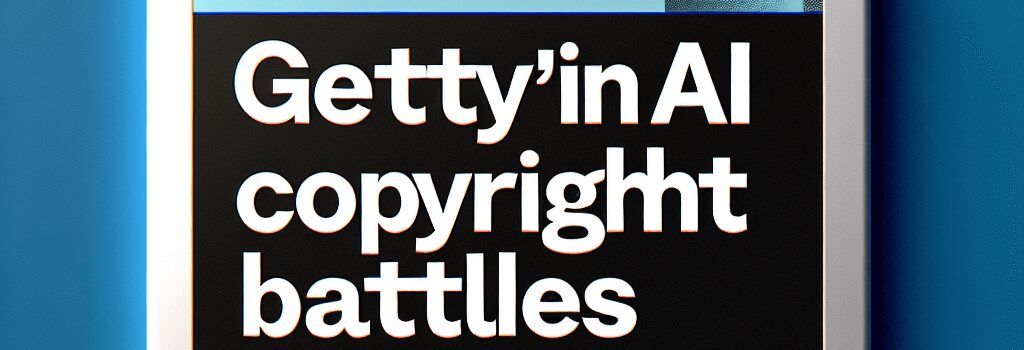Getty’s Strategy in AI Copyright Battles

Money troubles
Since 2022, Getty Images has positioned itself as a leading defender of artists’ rights in the face of AI-driven image generation. The company banned unlicensed AI-generated uploads, launched a “socially responsible” image generator integrated with royalty-sharing, and in 2023 sued Stability AI for allegedly training Stable Diffusion on over 12 million Getty-owned photographs without permission or compensation. But Getty Images CEO Craig Peters told CNBC in May 2025 that legal costs have ballooned to the point where the company can no longer pursue every infringement.
“It’s extraordinarily expensive,” Peters said. “Even for Getty Images, we can’t pursue all the infringements that happen in one week—one court case alone has cost us millions.” High-stakes motions, eDiscovery for terabytes of scraped data, expert witness fees (often north of $500K per litigation), and multiple appeals rack up a six-figure daily burn.
Getty vs. Stability AI: The high cost of “fair use”
In its 2023 complaint, Getty alleged Stability AI ingested 12 million photos plus metadata—approximately 14 TB of data—into its training pipeline without licensing agreements. The suit argues that Stability AI “chose to ignore viable licensing options … in pursuit of stand-alone commercial interests.” Stability AI has maintained that large-scale web scraping for model training constitutes “fair use” under U.S. copyright law.
“These systems train on vast amounts of data,” Stability AI representatives told multiple outlets. “We must be able to innovate.”
Peters counters that “calling nonconsensual scraping ‘innovation’ is theft under the guise of disruption.” Getty estimates that licensing even a fraction of its library for a comparable model would have cost Stability AI less than $20 million—just a fraction of the multi-million legal fees Getty has incurred.
Broader backlash and emerging precedents
The debate has galvanized both sides. Former Meta VP Nick Clegg sparked online ridicule by arguing artist consent mechanisms would “kill” AI progress. On X, Fairly Trained’s CEO Ed Newton-Rex likened such claims to defending Napster-style piracy. Meanwhile, the European Parliament recently approved amendments to the Digital Copyright Directive requiring explicit rights-holder opt-in for model training—a potential harbinger for similar measures in the U.S.
Technical deep dive: Data ingestion to inference
Training a high-resolution image model like Stable Diffusion typically involves:
- Data harvesting: scraping 1–2 billion images from the public web, then filtering and deduplicating down to 50–100 million.
- Preprocessing: resizing images to 512×512 px, encoding captions into text embeddings via a CLIP backbone (often ViT-B/32).
- Model training: running on 256 A100 or H100 GPUs over several weeks, with cloud compute costs up to $1.6 million per run.
- Fine-tuning and safety layers: injecting watermark detection, NSFW filters, and bias mitigation algorithms—each adding development cycles and legal review.
Getty’s argument: if rightsholders aren’t compensated for the raw assets, their proprietary metadata and stylistic contributions are expropriated at scale.
Economic impact analysis
Experts estimate the global stock imagery market at ~$4 billion annually. Unlicensed AI training potentially displaces up to 15 percent of paid licensing revenue. Getty’s own internal models project a $600 million revenue shortfall over five years should unlicensed AI become pervasive.
“When you account for lost royalties, devalued IP, and litigation overhead, the real cost of unlicensed AI training could exceed $1 billion industry-wide by 2030,” says Prof. Pamela Samuelson of UC Berkeley School of Law, an authority on copyright and emerging tech.
Global regulatory landscape
- United States: The Copyright Office is soliciting comments on AI exemptions; the DOJ’s June 2025 guidance emphasizes “good faith licensing.”
- European Union: New Digital Copyright Directive rules require opt-in, with fines up to €20 million for noncompliance.
- United Kingdom: The High Court is weighing a landmark test case on “fair dealing” vs. “fair use,” expected to set a precedent by Q4 2025.
- China: No statutory copyright protections for scraped datasets, giving local firms an advantage in unlicensed model development.
Getty’s strategic response
Faced with skyrocketing legal fees, Getty is pivoting to policy and industry solutions. In a recent submission to the White House’s AI Action Plan, the company urged against a broad “right to learn” exemption for AI firms, arguing that clear licensing regimes promote sustainable innovation and equitable revenue sharing.
“U.S. copyright laws are not hindering AI progress; they provide the incentive structure necessary for fair participation and downstream public benefits,” Getty wrote.
Peters says Getty will remain selective about litigation but will continue to pursue high-impact cases that clarify legal boundaries, hoping to establish precedents that balance innovation with artists’ rights.
Looking ahead
As courts in the U.S. and abroad tackle AI-training exemptions, Getty’s experience underscores a new reality: copyright enforcement in the AI era is both critical and costly. Whether through litigation, policy advocacy, or collaborative licensing platforms, rightsholders and AI developers must find scalable solutions—or face an industry rewritten on contested legal ground.